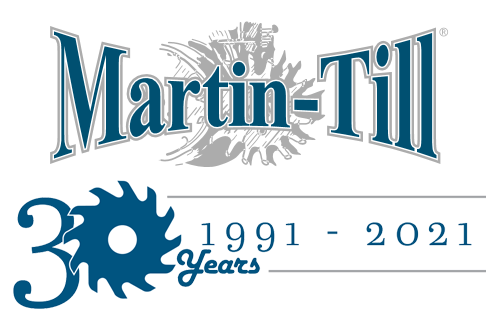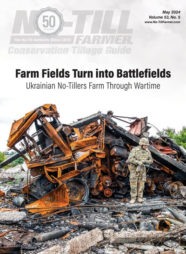Philip Rowbottom runs a 500-acre farm and a 27-hole golf course in West Yorkshire. In a recent feature for Direct Driller Magazine, the 3rd generation arable farmer explained his transition to no-till and how it's already having a noticeable impact on his farm:
“The farm covers around 500 acres just south of Wakefield. Today we farm 300 acres, with the golf course covering the remainder.
The diversification into the golf course was pivotal in how we farm today. Over breakfast one morning, way back in 1991, my father announced we should build a golf course. None of us played golf, or had any real interest in golf, but that's what we did and that's what we’ve done for the last 30 years. Built, operated and expanded the golf side of our business.
Sport has always been part of my life; I’ve always been competitive. I got involved with the local shooting club, mainly as a way to get away from the farm for a few hours. As I improved, it became more and more competitive and I’ve been very lucky to represent the country, shooting clays around the world.
The farm is still very much part of our business. Being right on the border of a livestock/arable region, we’ve traditionally sold all of our straw, it was becoming increasingly clear to me that our sandstone land needed something putting back. We needed to improve the organic matter, so we stopped selling it and began incorporating it.
The change of legislation around disposal of domestic garden waste opened up an opportunity to access compost locally. Over winters we were able to bring 2000-3000 tonnes of compost onto the farm, over a period of five to six years.
I knew we were beginning to see very subtle changes to our soils. Our soils are incredibly abrasive, you go ploughing on the wrong day and you can see the metal wear. Watching how the industry was changing, min- till, zero cultivation, changes in weather patterns, wet seasons, I knew we needed to do something different.
In 2020 I bought a subsoiler, we’d never had one on the farm, the wet autumn of 2019 and warm dry spring of 2020 baked our sandy soils, consequently, or wheat yields crumbled. We used the Phillip Watkins Tri-till to establish our oil seed rape crop in 2020, possibly our best yielding rape crop we’ve ever grown.
Subconsciously, I knew I was going to do something differently. Technology has moved on, watching the farming press for a couple of years Direct Drills have moved forward from the Bettison DD we had here 50 years ago, I looked at a few different options, and without having a demo I decide that the Opico Sky drill offered me everything I needed from a Direct Drill.
Aside from the benefits mentioned above another factor in the decision making was the looming reduction of the BPS payments, we’ve always done a bit of contracting, I saw an opportunity to be able to offer Direct Drilling service locally. It would be a way of filling that loss of the BPS, its first year has seen around 500 acres with the drill, the hope is to increase that acreage this autumn.
In two seasons we’d gone from plough-based crop establishment, to min- till with the Phillip Watkins Tri-till to having an 4M Opico Sky Drill on farm for autumn 2021 and growing cover crops!
I believe the transition across to Direct Drilling is something I’ve been working on for a number of years. By incorporating chopped straw and adding the compost, changing the soils structure has allowed me to take that step to go down the direct drill route. You often hear farmers say they’ve tried cover crops twice and they’ve failed, so it doesn't work, it won’t in two years. It takes three to five years, it takes time and perseverance, finding the correct plants for your soils and not just planting one or two varieties either.
Between my agronomist and seed supplier, we decided that to grow a six-way cover crop, 40ha into rape stubble, including vetch, clover, radish, rye and phacelia.
Rye was a mistake, especially in milling wheat, I’ll admit. I bottled it, I sprayed it all off, barring a couple of patches in different fields, cover crop varieties are something we need to look at differently this year.
Slugs were a bigger problem than we’ve experienced on this farm before, yes we maybe should have put slug pellets on at the time of drilling, the Sky drill is all set up to do that, but I’m pretty certain it's down to the mat of chopped straw, which in previous years would have been moved or buried mechanically, I went straight in with the drill.
I’ve invested in a 2nd hand straw rake for this year to see what difference that makes, I’m very happy to admit that I’m still learning, it’s still a bit of a journey of discovery!
We compromised the farm's rotation when we built the golf course, the rotation of rape, wheat, wheat is what we’ve grown and will continue to do so moving forward, for the time being ,while trying to improve the soil quality with cover crops and using the Direct Drill to establish our cash crops.
The farm is only part of my business and it needs to be easy to manage, the direct drill has already freed up time, reduced inputs, certainly on fuel costs, by as much as two thirds already. That is before you add in the wearing metal cost from previous systems and I believe we’ll continue to see reduced costs as the soil health and organic matter improves.
It’s very difficult to quantify, but I’m already starting to see a change to the ecology on the farm, as an SFI pilot farm, the first time we’ve ever entered into an environmental scheme, the wildlife on the farm seems to be increasing from not ploughing, from having green cover on fields between harvest and planting.
We’re still learning, we tried broadcasting clover into a wheat crop, sadly it didn’t grow, but we’ll try again this autumn but with the drill as a companion crop.
So far, the results have been very encouraging, the crops look as well as they have ever done on the old system, the Skyfall wheat looks fantastic and the oilseed rape looks much better than I hoped it would be.
As ever in this job, the proof will be when it comes off the combine and over the weighbridge. I look forward to updating you on how our first direct drilled harvest turns out later in the year.”
The No-Till Passport series is brought to you by Martin Industries.
Since 1991, Martin Industries has designed, manufactured and sold leading agriculture equipment across the U.S. and Canada. Known for Martin-Till planter attachments, the company has expanded to include a five-step planting system, closing wheel systems, twisted drag chains, fertilizer openers and more in their lineup. Their durable and reliable planter attachments are making it possible for more and more farmers to plant into higher levels of residue.








Post a comment
Report Abusive Comment